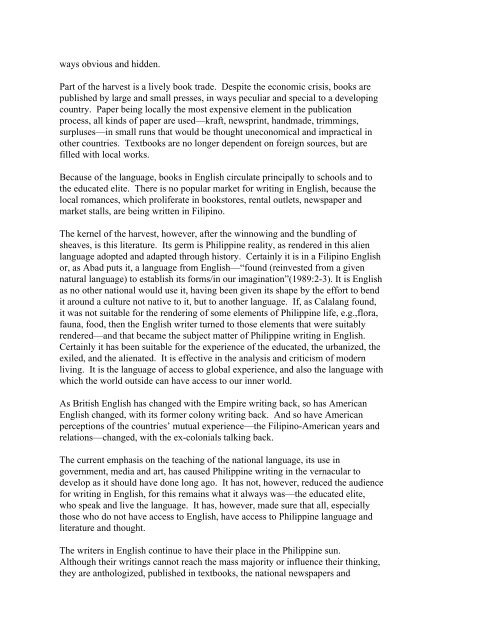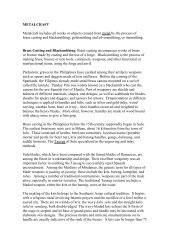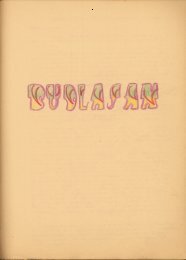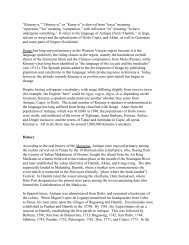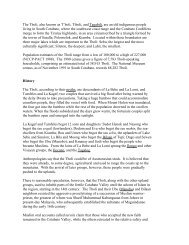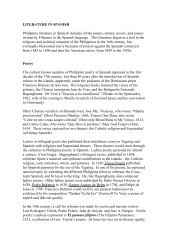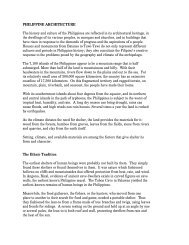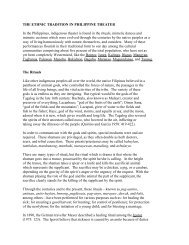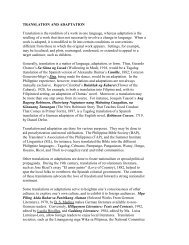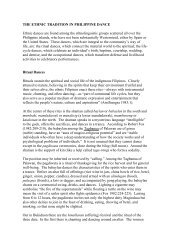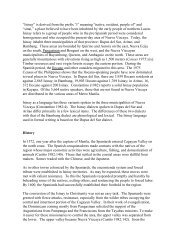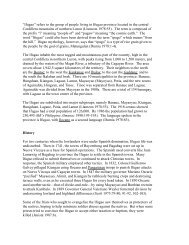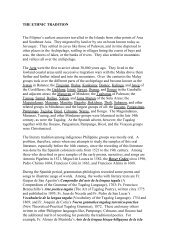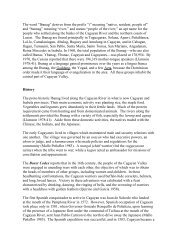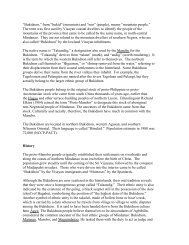LITERATURE IN ENGLISH Philippine literature in English is ...
LITERATURE IN ENGLISH Philippine literature in English is ...
LITERATURE IN ENGLISH Philippine literature in English is ...
You also want an ePaper? Increase the reach of your titles
YUMPU automatically turns print PDFs into web optimized ePapers that Google loves.
ways obvious and hidden.<br />
Part of the harvest <strong>is</strong> a lively book trade. Despite the economic cr<strong>is</strong><strong>is</strong>, books are<br />
publ<strong>is</strong>hed by large and small presses, <strong>in</strong> ways peculiar and special to a develop<strong>in</strong>g<br />
country. Paper be<strong>in</strong>g locally the most expensive element <strong>in</strong> the publication<br />
process, all k<strong>in</strong>ds of paper are used—kraft, newspr<strong>in</strong>t, handmade, trimm<strong>in</strong>gs,<br />
surpluses—<strong>in</strong> small runs that would be thought uneconomical and impractical <strong>in</strong><br />
other countries. Textbooks are no longer dependent on foreign sources, but are<br />
filled with local works.<br />
Because of the language, books <strong>in</strong> <strong>Engl<strong>is</strong>h</strong> circulate pr<strong>in</strong>cipally to schools and to<br />
the educated elite. There <strong>is</strong> no popular market for writ<strong>in</strong>g <strong>in</strong> <strong>Engl<strong>is</strong>h</strong>, because the<br />
local romances, which proliferate <strong>in</strong> bookstores, rental outlets, newspaper and<br />
market stalls, are be<strong>in</strong>g written <strong>in</strong> Filip<strong>in</strong>o.<br />
The kernel of the harvest, however, after the w<strong>in</strong>now<strong>in</strong>g and the bundl<strong>in</strong>g of<br />
sheaves, <strong>is</strong> th<strong>is</strong> <strong>literature</strong>. Its germ <strong>is</strong> <strong>Philipp<strong>in</strong>e</strong> reality, as rendered <strong>in</strong> th<strong>is</strong> alien<br />
language adopted and adapted through h<strong>is</strong>tory. Certa<strong>in</strong>ly it <strong>is</strong> <strong>in</strong> a Filip<strong>in</strong>o <strong>Engl<strong>is</strong>h</strong><br />
or, as Abad puts it, a language from <strong>Engl<strong>is</strong>h</strong>—“found (re<strong>in</strong>vested from a given<br />
natural language) to establ<strong>is</strong>h its forms/<strong>in</strong> our imag<strong>in</strong>ation”(1989:2-3). It <strong>is</strong> <strong>Engl<strong>is</strong>h</strong><br />
as no other national would use it, hav<strong>in</strong>g been given its shape by the effort to bend<br />
it around a culture not native to it, but to another language. If, as Calalang found,<br />
it was not suitable for the render<strong>in</strong>g of some elements of <strong>Philipp<strong>in</strong>e</strong> life, e.g.,flora,<br />
fauna, food, then the <strong>Engl<strong>is</strong>h</strong> writer turned to those elements that were suitably<br />
rendered—and that became the subject matter of <strong>Philipp<strong>in</strong>e</strong> writ<strong>in</strong>g <strong>in</strong> <strong>Engl<strong>is</strong>h</strong>.<br />
Certa<strong>in</strong>ly it has been suitable for the experience of the educated, the urbanized, the<br />
exiled, and the alienated. It <strong>is</strong> effective <strong>in</strong> the analys<strong>is</strong> and critic<strong>is</strong>m of modern<br />
liv<strong>in</strong>g. It <strong>is</strong> the language of access to global experience, and also the language with<br />
which the world outside can have access to our <strong>in</strong>ner world.<br />
As Brit<strong>is</strong>h <strong>Engl<strong>is</strong>h</strong> has changed with the Empire writ<strong>in</strong>g back, so has American<br />
<strong>Engl<strong>is</strong>h</strong> changed, with its former colony writ<strong>in</strong>g back. And so have American<br />
perceptions of the countries’ mutual experience—the Filip<strong>in</strong>o-American years and<br />
relations—changed, with the ex-colonials talk<strong>in</strong>g back.<br />
The current emphas<strong>is</strong> on the teach<strong>in</strong>g of the national language, its use <strong>in</strong><br />
government, media and art, has caused <strong>Philipp<strong>in</strong>e</strong> writ<strong>in</strong>g <strong>in</strong> the vernacular to<br />
develop as it should have done long ago. It has not, however, reduced the audience<br />
for writ<strong>in</strong>g <strong>in</strong> <strong>Engl<strong>is</strong>h</strong>, for th<strong>is</strong> rema<strong>in</strong>s what it always was—the educated elite,<br />
who speak and live the language. It has, however, made sure that all, especially<br />
those who do not have access to <strong>Engl<strong>is</strong>h</strong>, have access to <strong>Philipp<strong>in</strong>e</strong> language and<br />
<strong>literature</strong> and thought.<br />
The writers <strong>in</strong> <strong>Engl<strong>is</strong>h</strong> cont<strong>in</strong>ue to have their place <strong>in</strong> the <strong>Philipp<strong>in</strong>e</strong> sun.<br />
Although their writ<strong>in</strong>gs cannot reach the mass majority or <strong>in</strong>fluence their th<strong>in</strong>k<strong>in</strong>g,<br />
they are anthologized, publ<strong>is</strong>hed <strong>in</strong> textbooks, the national newspapers and


